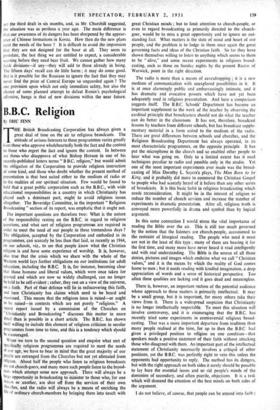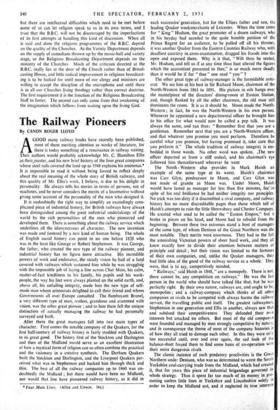B.B.C. Religion
B) ERIC FENN
1 he important questions are therefore two: What is the nature of the responsibility resting on the B.B.C. in regard to religious questions, and what sort of religious programmes are required in order to meet the need of our people in these tremendous days ? The obligation, accepted by the Corporation and embodied in its programmes, can scarcely be less than that laid, as recently as 1944, on our schools, viz., to see that people know what the Christian religion is and have some experience of worship. It is, however, also true that the crisis which we share with the whole of the Western world lays further obligations on our institutions for adult education, including the B.B.C. It is, for instance, becoming clear that those humane and liberal values, which were once taken for granted and which are now so widely challenged, can no longer be held to be self-evident ; rather, they rest on a view of the universe, on a faith. Part of their defence will lie in rediscovering this faith, and here Christianity has claims which need to be heard and examined. This means that the religious issue is raised—or ought to he raised—in contexts which are not purely " religious." A recent report issued by a commission of the Churches on "Christianity and Broadcasting " discusses this matter in more detail than is possible in a short article. The B.B.C. has shown itself willing to include this element of religious criticism in secular programmes from time to time, and this is a tendency which should be encouraged.
When we turn to the second question and enquire what sort of Specifically religious programmes are required to meet the needs of our age, we have to bear in mind that the great majority of our People are estranged from the Churches but not yet alienated from religion. About half the people who listen to religious broadcasts are not church-goers, and many more such people listen to the broad- casts which attempt some new approach. There will always be a large opportunity in broadcasting to minister to those who, for one reason or another, are shut off from the services of their own chinches, and the radio will always be a means of enriching the life of ordinary church-members by bringing them into touch with
great Christian minds ; but to limit attention to church-people, or even to regard broadcasting as primarily directed to the church- goer, would be to miss a great opportunity and to ignore an out- standing fact. What matters is the state of mind and heart of our people, and the problem is to lodge in them once again the great governing facts and ideas of the Christian faith. So far they have shown themselves willing to listen to anything which seems to them to be " alive," and some recent experiments in religious broad- casting, such as those on Sunday nights by the present Rector of Warwick, point in the right direction.
The radio is more than a means of eavesdropping ; it is a new medium of communication with unexplored possibilities in it. It is at once alarmingly public and embarrassingly intimate, and it has dramatic and evocative powers which have not yet been adequately used in religious presentation. And here a comparison suggests itself. The B.B.C. Schools' Department has become an important supplement to the work of the teacher by observing the cardinal principle that broadcasters should not do what the teacher can do better in the classroom. It has not, therefore, broadcast lessons by teachers from different schools, but has broadcast supple- mentary material in a form suited to the medium of the radio. There are great differences between schools and churches, and the Religious Broadcasting Department has always operated, in its most characteristic programmes, on the opposite principle. It has put the microphone in the church and so enabled other people to hear what was 'going on. Only to a limited extent has it used techniques peculiar to radio and possible only in the studio. Yet one of the most important experiments ever made was the broad- casting of Miss Dorothy L. Sayers's plays, The Man Born to be King, and it probably did more to commend the Christian Gospel to people who had scarcely heard of it before than any other series of broadcasts. It is this basic habit in religious broadcasting which needs reconsideration. It might be in the interest of religion to reduce the number of church services and increase the number of experiments in dramatic presentation. Alter all, religious truth is conveyed more powerfully in drama and symbol than by logical argument.
In this same connection I would stress the vital importance of reading the Bible over the air. This is still too much governed by the notion that the listeners are church-people, accustomed to the restraint of liturgical reading. The people who need it most are not in the least of this type ; many of them are hearing it for the first time, and many more have never heard it read intelligently and with real understanding. The Bible is the source of all those stories, pictures and images which enshrine what we call " Christian values," and it is the means by which the reality of God comes home to men ; but it needs reading with kindled imagination, a deep appreciation of words and a sense of historical perspective. Too often these qualities are lacking and it goes dead and meaningless.
There is, however, an important section of the potential audience whose approach to these matters is primarily intellectual. It may be a small group, but it is important, for many others take their views from it. There is a widespread suspicion that Christianity is no longer intellectually respectable. To meet this situation will involve controversy, and it is encouraging that the B.B.C. has recently tried some experiments in controversial religious broad- casting. That was a more important departure from tradition than many people realised at the time, for up to then the B.B.0 had given a privileged position to religion on one condition—that speakers made a positive statement of their faith without attacking those who disagreed with them. An important part of the intellectual statement of Christianity necessarily involves a critique of other positions, yet the B.B.C. was perfectly right to veto this unless the opponents had opportunity to reply. The method has its dangers, but with the right approach on both sides it surely should be possible to lay bare the essential issues and so rid people's minds of the dominion of secondary, and often puerile, objections. It is a task which will demand the attention of the best minds on both sides of the argument.
I do not believe, of course, that people can be argued into faith ; but there are intellectual difficulties which need to be met before some of us can let religion speak to us in its own terms, and I trust that the B.B.C. will not be discouraged by the imperfections of its first attempts at handling this kind of discussion. When all is said and done the religious programmes of the B.B.C. depend on the quality of the Churches. As the Variety Department depends on the supply of comedians thrown up by the music-hall and variety stage, so the Religious Broadcasting Department depends on the ministry of the Churches. Much of the criticism directed at the B.B.C. really lies at the door of the Church rather than of Broad- casting House, and little radical improvement in religious broadcast- ing is to be looked for until more of our clergy and ministers are willing to accept the discipline of the microphone and until there is in all our Churches living theology rather than correct doctrine. The first requirement it is the function of the Religious Broadcasting Staff to foster. The second can only come from that awakening of the imagination which follows from waiting upon the living God.



































 Previous page
Previous page